The Rug Shop
 Succession planning within family businesses is both complex and nuanced, with many
aspects that have to be carefully considered by all of those involved. When Rudy
Paoletti, Jr. reached out to the SBDC, his own family business was faced with the
complicated and emotional journey faced by so many legacy businesses.
Succession planning within family businesses is both complex and nuanced, with many
aspects that have to be carefully considered by all of those involved. When Rudy
Paoletti, Jr. reached out to the SBDC, his own family business was faced with the
complicated and emotional journey faced by so many legacy businesses.
The Rug Shop, Inc. is a 3rd generation commercial contracting business specializing in a wide array of floor coverings for commercial applications. Incorporated by his grandfather in 1965, The Rug Shop, Inc. has been – and remains – a fixture in the commercial flooring industry in the region. Ownership of the business rested with Rudy’s father and two uncles since the 1970s. They had come to the crossroads of negotiating the smooth transfer of the business to Rudy. As with many businesses, outdated agreements and changing economic conditions meant that prior plans left on the shelf no longer applied.
Rudy reached out to Certified Small Business Advisor Bob Griffin to get assistance in understanding the various options available to him and his family’s business. Bob performed a thorough financial analysis of the business, including a basic business valuation to provide Rudy the information he needed to take the appropriate action for him and his family. Bob also served as a resource for Rudy’s exploration of various options and scenarios as the process evolved.
Rudy and his family successfully navigated the complexities of the business succession. The Rug Shop, Inc. has since managed to secure several major contracts as a direct result of successfully settling the transition of the business to the new ownership structure.
“The Rug Shop, Inc. faced several challenges throughout the transfer of ownership.
Bob Griffin and the SBDC provided objective insight and tools needed for risk assessment
and financial projections instrumental in the decision-making process.”
~ Rudy Paoletti, Jr.
The Lost Dog Café
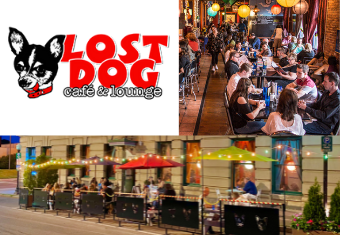 Starting as musicians in an all-girl band, Liz and Marie worked in many restaurants
in New York City while pursuing their dream of creating music. After ten years they
earned more restaurant experience than originally anticipated and decided to return
to their hometown of Binghamton, NY and open a café (similar to the cafes seen in
NYC’s East and West Village).
Starting as musicians in an all-girl band, Liz and Marie worked in many restaurants
in New York City while pursuing their dream of creating music. After ten years they
earned more restaurant experience than originally anticipated and decided to return
to their hometown of Binghamton, NY and open a café (similar to the cafes seen in
NYC’s East and West Village).
They created a comfortable, unassuming bohemian place where people could hang out, eat good food and drink great coffee. After a couple of years, they needed a larger space to accommodate bands, local art displays and more customers in a spacious, full-service restaurant with a full bar. Growing and moving their business proved to be challenging. There were few viable restaurants in downtown Binghamton in the 1990s and they difficulty obtaining financing. They went to the Binghamton Small Business Development Center (SBDC) for assistance with their business plan, financial forecasts and loan packaging; and were able to obtain the needed financing.
They quickly became active members in the revitalization of downtown and the development of the newly growing art scene. The Visitors Bureau instantly highlighted the Lost Dog Café as a “must go” when in Binghamton for the delicious and unique food, atmosphere, art, music and warm hospitality.
Following a flood in 2010 due to a burst sprinkler system, the Lost Dog shut down
for a few weeks. Once again, they returned to the SBDC for assistance and in 2012
worked with the SBDC to obtain a loan to expand their business to include a lounge
appealing to both college students and corporate executives.
In 2017, they were encouraged to bottle and sell their Ala Vodka sauce and salad dressing.
They asked the Binghamton SBDC for guidance on processing and marketing their products
in order to be available on grocery store shelves, subsequently forming Lost Doggie
Bag, LLC.
When the pandemic closed their restaurant and the schools were in a mandated shut down, Liz and Marie provided lunch to children twice a week in disadvantaged neighborhoods. They returned to the SBDC for help obtaining SBA Disaster Recovery financing and guidance with NYS re-opening guidelines. The Lost Dog was able to successfully open their outdoor business by putting covered and uncovered tables on the sidewalk, and they also expanded their take-out business. They were able to hire back many of their employees and opened indoors at the recommended capacity limits. They also worked with the SBDC to help them with their Restaurant Recovery Fund application.
The Lost Dog Café continues their relationship with the SBDC as they begin their process to become WBE Certified in order qualify for initiatives, programs and contracts in the Greater Binghamton area and beyond.
To learn more about The Lost Dog Café, you can visit their website at: https://www.lostdogcafe.net.
The Relief Pitcher
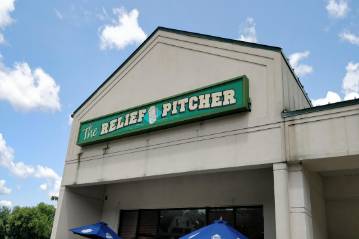 Tabatha Newton contacted the Small Business Development Center at Binghamton University
to help her acquire an iconic Binghamton restaurant and bar that meant something special
to her. Tabatha had worked at The Relief pitcher for many of the 33 years it had been
open. Started by Bob Pastor in 1985, The Relief Pitcher grew a solid area following
for their great food, terrific service, and sports fan appeal.
Tabatha Newton contacted the Small Business Development Center at Binghamton University
to help her acquire an iconic Binghamton restaurant and bar that meant something special
to her. Tabatha had worked at The Relief pitcher for many of the 33 years it had been
open. Started by Bob Pastor in 1985, The Relief Pitcher grew a solid area following
for their great food, terrific service, and sports fan appeal.
Tabatha worked with SBDC Advisors Bob Griffin and Chuck Schwerin, multiple lenders and seller Bob Pastor to make her dream a reality. After months of dedication and perseverance, Tabatha was able to successfully complete the sale, and is now the new owner of The Relief Pitcher. In doing so, Tabatha is able to continue to provide employment for more than 20 full- and part-time employees. She has introduced a new menu, a new website, and is also making plans for aesthetic improvements to The Relief Pitcher. The SBDC is pleased to welcome Tabatha to the world of Small Business Ownership. For more information on The Relief Pitcher, please visit https://reliefpitcherny.com/
Uncorked Creations and 205 Dry
 Beginning in 2010, Alise came to the SBDC looking for guidance to help her with a
business plan for a new bar in the area. Financing for a bar, as well as finding
a suitable location, were challenges that prevented Alise from the initial vision
she had for her small business adventure. Of the support Alise received from the
SBDC during that time, she admitted that in addition to the basics of starting a business,
listening and encouragement were most important.
Beginning in 2010, Alise came to the SBDC looking for guidance to help her with a
business plan for a new bar in the area. Financing for a bar, as well as finding
a suitable location, were challenges that prevented Alise from the initial vision
she had for her small business adventure. Of the support Alise received from the
SBDC during that time, she admitted that in addition to the basics of starting a business,
listening and encouragement were most important.
By the time Alise had returned to the SBDC at the end of 2014, she had already opened Uncorked Creations, a unique BYOB “paint and sip” experience, where guests could bring their favorite vintage and paint their own personal Picasso. No matter the level of talent, an enjoyable experience was the ultimate artistic creation.
Uncorked continued to grow and expand, adding more lofts and more to experience. A wine & chocolate bar is now open regularly and is a favorite for private parties with a secluded feel and spectacular ambiance. The arts program has expanded, and guests can dabble in acrylics, watercolor, do-it-yourself wood signs, pottery and ceramics, complete with a kiln.
After tremendous research, numerous trips to New York City and Paris with her devoted husband Phil, 205 Dry opened in January of 2018. The entire building is now a shrine to creative expression and immersive experiences. Judi Hess, Director of Visit Binghamton said, “She had the drive and ambition to make her vision for what the building at 205 State Street could be into a reality. Downtown Binghamton has emerged as a foodie and art haven that is increasingly popular. Businesses like 205 Dry and Uncorked Creations are contributors to that popularity.”
The evidence of Alise’s success is unquestioned in the results. In 2015, Uncorked Creations employed 5 people; this time-machine at 205 State Street ended 2018 now provide more than 35 jobs.
Alise Willerton had a vision. She crafted that vision over time with a passion for creating exceptionally unique experiences and contributing to the transformation of downtown Binghamton. Alise had perseverance. When financiers were hesitant, she found other ways. When legal challenges threatened her vision, she fought back. And when the easy path was not readily available, she adapted. The willpower Alise applied to her vision has resulted in two spectacular businesses with transformational impact for Binghamton.
In May of 2019, Alise was presented a well-deserved SBA Excellence Award for her amazing success story. For more information on 205 Dry please visit https://205dry.com/
Chenango Point Cycles
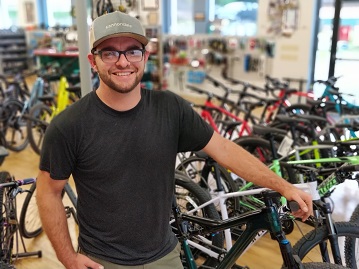
Like so many of us, Anthony Folk had a dream For more than 20 years, Anthony had lived in the world of cycling. After years of working in a number of areas of the industry in our region, Anthony wanted to fulfill his dream of owning his own bike shop.
An earlier opportunity in the western United States had not worked out due to a number of factors. But in the fall of 2018, Anthony had connected with the owner of Chenango Point Cycles, Jim Delaney, about the possibility of purchasing his store. Opened since 1988, Chenango Point has been a fixture in the cycling landscape of the southern tier of New York state.
Anthony came to the SBDC to assist him in creating a business plan and securing financing. Certified Small Business Advisor Bob Griffin guided Anthony through the process, covering legal topics, accounting topics, developing a solid cash flow and exploring options with local lenders. After months of careful planning and dedication, Anthony was able to work with the prior owner and Key Bank to make his dream a reality. He took ownership of his bike shop in June 2019.
Anthony intends to continue to grow and foster the trusted relationships with the cycling community members, deepen the roots of Chenango Point Cycles in the Southern Tier cycling community and grow awareness for the store and for cycling in the area as a whole.
“I will accomplish this by focusing deeply on three pillars: a diverse brand offering, excellent customer service, and engaging community events.”
Of the support he received from the SBDC, Anthony said,
“The SBDC was instrumental in helping me accomplish my lifelong dream. My advisor Bob is inciteful, knowledgeable, timely, and flexible. He guided me through each process I had a question about and worked with me until we found a solid solution or path for each component of my purchase of Chenango Point Cycles. He and the SBDC continue to be on my side as me and my business grow. Bob started as my advisor and quickly became someone who I can happily call my mentor. I want to thank Bob and the SBDC for all that they have done.”
The SBDC was very happy to have been there to help Anthony to realize his dream. For more information on Chenango Point Bicycle Company, please visit http://www.chenangopoint.com
Enhance-VR
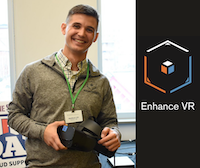 In 2015, Matt Gill began working as a Binghamton University freshman with a graduate
student on a spin-off project for a virtual reality skiing simulator. This entry
into the world of virtual reality has since become a passion for Matt. Along with
another computer science student, Matt began making virtual reality projects, specifically
a race car simulator in a 36-hour hackathon from PVC pipe, duct tape, wood, and bicycle
parts.
In 2015, Matt Gill began working as a Binghamton University freshman with a graduate
student on a spin-off project for a virtual reality skiing simulator. This entry
into the world of virtual reality has since become a passion for Matt. Along with
another computer science student, Matt began making virtual reality projects, specifically
a race car simulator in a 36-hour hackathon from PVC pipe, duct tape, wood, and bicycle
parts.
Working with the Entrepreneurship Department at Binghamton University, Matt’s path took him towards funding for prototypes that were the initial foundation of Matt’s new company, EnhanceVR. By 2018, Matt became the sole owner of Enhance-VR, and based upon an exhaustive approach with customer discovery, learned that the business opportunity in virtual reality arcades was weak, and he chose to pivot into virtual reality for education.
This new direction included crafting full-room prototypes for schools, where over 70 teachers and administrators from across the Southern Tier were able to experience traveling to the Eiffel Tower, the surface of Mars, and the explosion of the volcano at Pompeii. The start-up costs affiliated with the development of these platforms for public schools were simply too great, and Matt chose to pivot again, this time to vocational and trade training opportunities.
Today, EnhanceVR is manufacturing workforce training experiences that serve two purposes: 1) vocational skills training for internal talent and 2) delivery to school environments for recruitment into the trade disciplines. Today, Enhance-VR’s proprietary platform can gather user and performance data to improve performance or evaluate potential candidates while connecting schools and training institutes for recruitment pipelines. In 2020, EnhanceVR is expected to generate at least $100,000 in new contracts for development of virtual reality platforms for both public and private sector enterprises, including workforce development projects. Matt’s leadership have propelled him into new and exciting partnerships with a number of training companies, state and local training facilities and private companies.
[The] SBDC, in my mind, has been very helpful for me in a multitude of ways over the last 2 /2.5 years I've started working with them but I think they could be best summarized as helping with my confidence to start, manage and grow my business. - Matt Gill
The SBDC at Binghamton University assisted Matt with the guidance he needed to select a local accountant to assist him with financial management issues of the company. In addition, the team of advisors assisted with operational guidance, testing different business models, providing connections to key leaders in target segments and providing research to help Matt make informed decisions.
Much of the data utilized in Matt’s pitch presentations over the past couple of years have been based on information curated by the SBDC’s Research Network. In addition, The technology advisor at the SBDC has assisted in coordinating new grant opportunities and facilitating connections with a potentially transformational project in Syracuse, NY.
On a more personal note: I truly wouldn't be where I am today without the help of SBDC. To be a recent grad pursuing a passion that is mentally and financially draining me, having the support (in traditional advising and personal help) from the team here has truly allowed me to feel confident that I can succeed with my business. I cannot thank them enough. - Matt Gill
To learn more about Enhance-VR, please visit: https://www.enhancevr.com
Cascun Farm
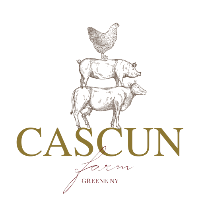 Donald and Andrea Cascun know how to preserver through difficult times, and COVID-19
was no exception. When COVID-19 swept the nation, and all the shutdowns occurred,
all the new business Cascun Farm had gained in NYC came to a halt. Like many other
small businesses, Cascun Farm had to shut down its operations and lay off employees.
Not accepting failure as an option, the Cascun family sat down and began brainstorming
new ways to do business.
Donald and Andrea Cascun know how to preserver through difficult times, and COVID-19
was no exception. When COVID-19 swept the nation, and all the shutdowns occurred,
all the new business Cascun Farm had gained in NYC came to a halt. Like many other
small businesses, Cascun Farm had to shut down its operations and lay off employees.
Not accepting failure as an option, the Cascun family sat down and began brainstorming
new ways to do business.
Persevering, Cascun Farm contacted the Small Business Development Center (SBDC) at
Binghamton University and worked with Bob Griffin as their Advisor. Andrea said, "Bob
was amazing – constantly giving updates on new funding opportunities, finding resources,
and always making us feel like we are a priority. He's very honest and upfront and
was willing to go to bat for me. We felt like someone was rooting for us. With Bob's
help, we were able to get the funding we needed to keep the Farm going".
With the help of the SBDC at Binghamton University and advisor Bob Griffin, Cascun
Farm received COVID-19 funding and bid successfully to be an approved vendor for the
NYC Food Banks, hired up to 30 employees, and created an online store. They learned
new skills while forming strong strategic relationships for product offerings, processing,
and distribution. Cascun Farm is stronger than ever because the owners didn't wait
to make things happen. As proactive entrepreneurs, they continuously look for ways
to do things smarter and more efficiently while taking advantage of new opportunities.
To learn more about Cascun Farm, please visit: https://cascunfarmmarket.com
People Grow Together

People Grow Together (PGT) in Windsor, NY, is a permaculture-inspired, family-owned farm focusing on regenerative farming. Co-owners Daniel Mastey and Jen Morabito started their business when they found out that companies were wrongly inflating the CBD industry with too high prices and false claims. They contacted the Small Business Development Center at Binghamton University, where Advisor Bob Griffin assisted them in establishing and growing their business.
Co-owner Jen Morabito noted, "Bob has been a wonderful asset to PGT in serving as a mentor over the past year. His guidance has helped aid our rapid growth and expansion of our business— from just the farm to now having a well-established premium CBD line of products. The connections he has made for us and guidance during the pandemic, specifically has been very valuable."
To learn more about People Grow Together, please visit; www.peoplegrowtogether.com.